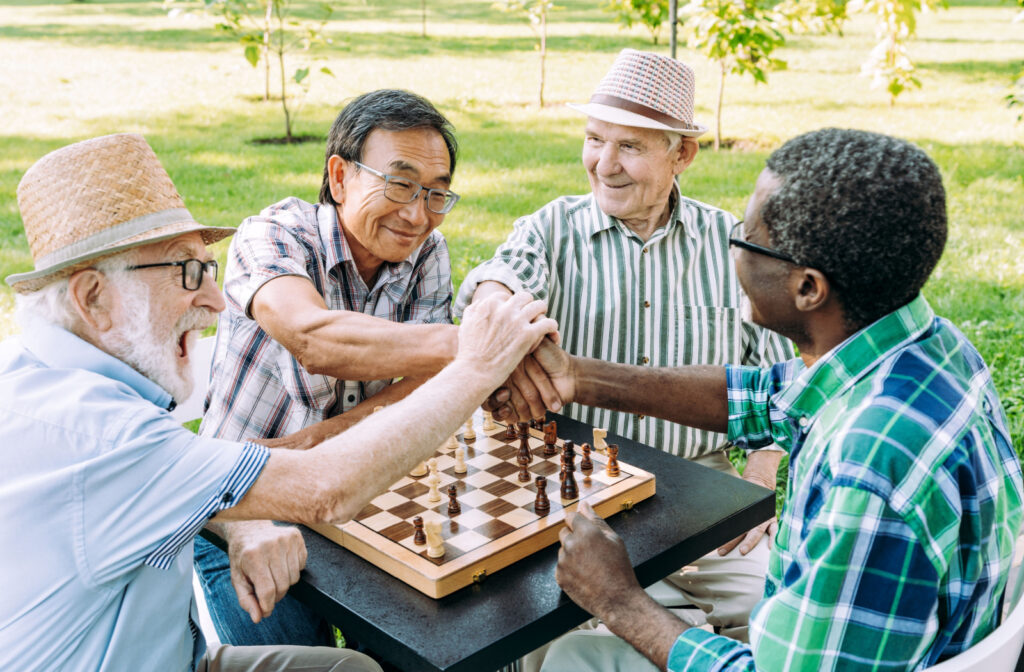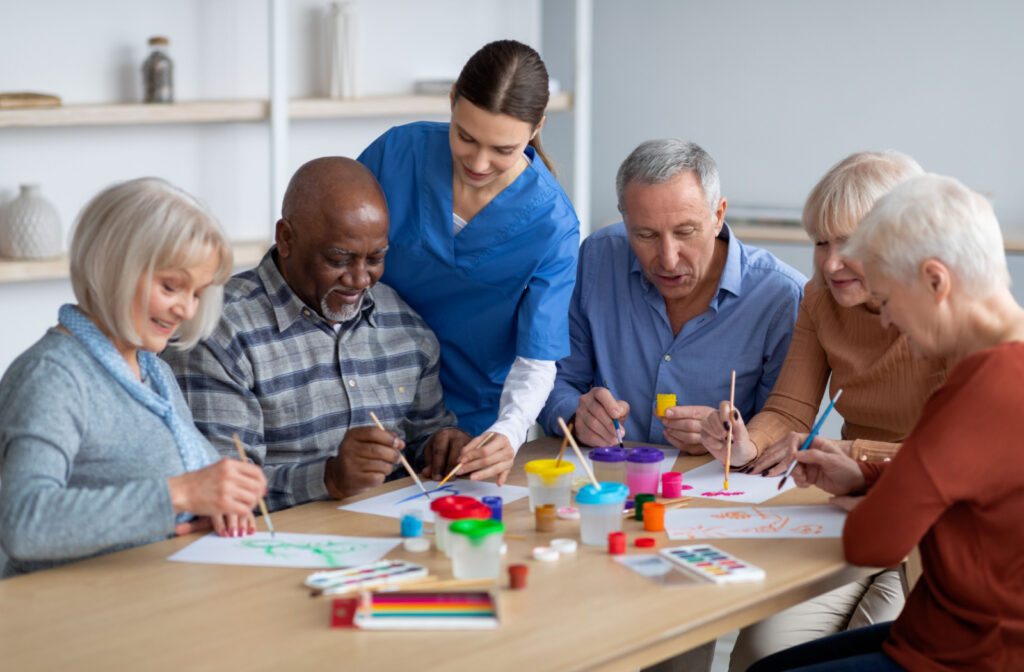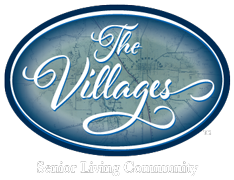Walking alongside someone battling dementia is a journey of love, patience, and resilience. As you look for ways to nurture their memory and moments of clarity, engaging activities become more than just pastimes—they transform into lifelines of connection and joy.
With this in mind, we can curate an experience that helps promote cognitive exercises and activities to enhance quality of life. Physical activities and mental stimulation ranging from exercise to therapies, music, art, and socialization can help support older adults experiencing cognitive decline. In a memory care community, these activities are used as therapy to help your loved one thrive.
What Is Memory Care?
Memory care is a specialized form of long-term care designed to support individuals with various forms of memory impairment, including Alzheimer’s disease and other types of dementia. Unlike standard assisted living options, memory care communities offer tailored care that addresses the unique challenges associated with cognitive decline.
With smaller staff-to-patient ratios, residents receive more personalized attention, ensuring their specific social, medical, and safety needs are met. These dedicated environments prioritize the safety of residents, employing measures to prevent wandering and mitigate other risks, particularly to those with memory issues.
Beyond the direct care provided to individuals, these communities often extend support services to family members, offering educational resources and assistance to help them understand and manage the effects of dementia. Memory care represents a compassionate approach that respects each individual’s dignity while addressing the complexities of their condition.
In addition, memory care programs include structured activities engineered to engage residents, fostering social interaction and stimulation to enhance cognitive functions.
Benefits of Engaging Activities
Every activity you share is a beacon of light. It’s not merely about passing the time, but rather, infusing your loved one’s days with meaning, preserving the essence of who they are through:
- Physical & Mental Stimulation: Activities encouraging your loved one’s body and mind to remain alert and active.
- Improved Mood & Well-Being: We foster happiness, brighten their mood, and promote well-being.
- Enhanced Cognitive Function: Carefully designed activities can unlock cognitive functions, even if it’s just for fleeting moments.
Activities for Seniors with Dementia
When your loved one is showing signs of cognitive decline, certain activities can help support a healthy mind and longevity.
Reminiscence Therapy
Sharing stories of old times, flipping through photo albums, and touching trinkets of the past can help seniors reconnect with old memories. It can help comfort older adults who are losing their memories and improve their self-esteem.
This therapy can be implemented in various ways:
- Visual, through photos or mementos
- Aural, by listening to music
- Taste, through eating a perfected family recipe
- Tactile, by holding important items
- Olfactory, and using the power of scent to connect with memories
Arts & Crafts
Each brush stroke and scissors snip are expressions of creativity. Creative activities can help older adults with dementia to communicate in a new way. They may also develop a more profound sense of purpose.
Gentle Exercise & Movement
Simple exercises like stretching, chair yoga, and other doctor-approved exercises can help support emotional well-being in those with dementia.
Older adults can exercise to support their physical health, including exercises for:
- Balance
- Strength
- Aerobics
Depending on the stage and type of dementia your loved one is experiencing, exercise will look different. Talking to a physical therapist or doctor is crucial to avoid injury.
Puzzles & Games
Puzzles and games work on important skills like:
- Problem-solving
- Visuospatial awareness
- Cognitive flexibility
- Perceptual reasoning
- Working memory
Your loved one can play games and do puzzles independently, but playing with others can promote socialization. Loneliness can negatively affect mental cognition and well-being, so social activities can help improve overall health in older adults.
Considerations for Choosing Activities
Your loved one doesn’t have to try every beneficial activity. Instead, stay flexible in choosing activities. Keep in mind:
- Individual Preferences & Interests: Their chosen activities should be echoes of past passions tailored to them.
- Safety: Every activity should be supervised to the degree that your loved one needs to feel connected to others and safe.
- Adaptations for Different Stages of Dementia: As dementia shifts, so must a person’s activities. Adapt to their changing needs as their condition develops.
Tips for Successful Engagement
To make activities enjoyable for your loved one:
- Create a Calm & Familiar Environment: Comfort is paramount when they’re engaging in activities.
- Establish a Routine: Consistency and routines are anchors, providing structure and predictability.
- Use Visual Cues & Prompts: Simple signs and gentle prompts can guide their way.
- Allow for Flexibility & Breaks: Accommodate their needs and respect moments when rest should take priority.

Explore Memory Care in Murfreesboro
Suitable activities can help support your loved one as their memory changes and help them maintain fulfilling lives. Memory care at The Villages of Murfreesboro curates a full calendar of activities and events designed to center your loved one’s mental, physical, and emotional well-being.
Schedule a visit today to see how memory care can support your loved one.




